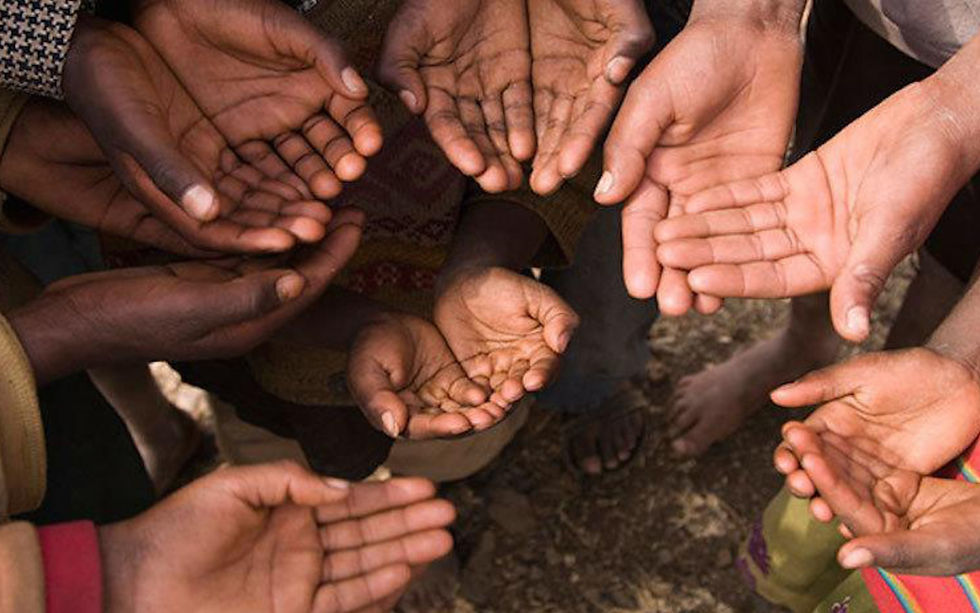World Hunger Epidemic
- Apr 22, 2018
- 4 min read

Around the world, 815 million people are suffering through hunger which makes up 11 percent of the global population. In 2000, there was a 27 percent decline of hunger worldwide, but now global hunger is on the rise again. In 2017, there was an increase of 38 million people worldwide that are going through hunger due to poverty and violent conflicts in countries. It has affected children tremendously since nearly half of deaths in children has been caused by malnutrition. Worldwide, 155 children under the age of 5 years suffer from stunting (prevent from developing properly). Out of the 155 million, 122 million children live in violent-conflicted areas. As a result, hunger has affected the lives of millions across the world due to multiple forms within the last decade.
Since 2010, conflict in countries has risen by 125 percent that have affected the lives of millions. 489 million out of 815 million people live in countries with ongoing violence. War conflicts take away the lands of farmers and their families then destroy their crops and livestock. They are restricted from selling their produce, growing any plants and getting access to water that leaves these families with no access to food or water. Wars in countries make citizens leave their homes, leading to hunger with no way of feeding themselves or their families. For example, over the past seven years in Syria, the war has killed thousands of people and forcing citizens to flee their homes. Residents are scarce of food since food markets are being destroyed. Many children are suffering from malnutrition by not eating for days. According to the U.N World Food Programme, "Syrians in the besieged enclave of Eastern Ghouta are so short of food that they are eating trash, fainting from hunger and forcing their children to eat on alternate days" (Miles 2017).
Economic crisis in most countries have resulted to its citizens struggling to survive due to food shortages. Due to the recession in Venezuela, prices have rose by 4,068 percent and over 90 percent of its population are in poverty. A hunger epidemic has taken a toll on its citizens due to supermarkets having empty shelves and price inflation. It's causing people to break out in angry riots since they are desperate for food, some people are breaking into warehouses and invading outlying farms to get food. In 2017, Venezuelans have reported to have lost 24 lbs in body weight and about 60 percent waking up hungry since they did not have enough money to buy food. There have been 2,800 cases of malnutrition and 400 deaths in children alone due to hunger.
Unfortunately, the government and their President Nicolas Maduro won't admit there is a crisis happening in Venezuela. "Maduro’s government denies there is a “humanitarian crisis” in the country and blames sanctions imposed by the United States for affecting the importation of food and medicine" (Schipp 2018). Venezuelans have developed their own strategies in order to survive.
Poverty has been the main source of hunger due to lack of resources and low income. People in most countries are living on an income of $1.90 a day or less. With little or no money, people are not able to purchase the sufficient amount of supplies needed to feed their families or farming supplies to grow their own crops. It causes millions to live in hunger and malnourishment since they don't have the proper nutrients to consume. Currently, there are 328 million children living in extreme poverty worldwide. Children are greatly affected in poverty since they are not receiving the proper nutrients to be able to grow, millions are living through malnutrition and diseases.
Currently, the world is producing enough food and resources to supply the global population. The United States alone can end world hunger with only $30 million, that’s a fraction of the $530 million the fund for their military. There are 1 billion people worldwide living in advanced economies that are able to come together to end world hunger and develop techniques to help these countries in need.
References
• World hunger again on the rise, driven by conflict and climate change, new UN report says. (2017, November 02). Retrieved April 9, 2018, from http://www.who.int/mediacentre/news/releases/2017/world-hunger-report/en/
• Samberg, L. (2017, October 17). World hunger is increasing thanks to wars and climate change. Retrieved April 9, 2018, from https://theconversation.com/world-hunger-is-increasing-thanks-to-wars-and-climate-change-84506
• Reuters. (2018, February 22). Venezuelans are starving amid economic crisis, food shortages. Retrieved April 9, 2018, from https://nypost.com/2018/02/22/venezuelans-are-starving-amid-economic-crisis-food-shortages/
• Miles, T. (2017, November 22). Besieged Syrians eating trash, fainting from hunger: U.N. survey. Retrieved April 9, 2018, from https://www.reuters.com/article/us-mideast-crisis-syria-hunger/besieged-syrians-eating-trash-fainting-from-hunger-u-n-survey-idUSKBN1DM2IP
• Otis, J. (2018, January 21). 'We loot or we die of hunger': Food shortages fuel unrest in Venezuela. Retrieved April 9, 2018, from https://www.theguardian.com/world/2018/jan/21/venezuela-looting-violence-food-shortages
• Schipp, D. (2018, January 23). 'We loot or we die of hunger'. Retrieved April 9, 2018, from http://www.news.com.au/finance/economy/world-economy/we-loot-or-we-die-of-hunger-starving-venezuelans-steal-kill-to-eat/news-story/30e1122ebd174c9b8f5b971f0801f2d5
• Action Against Hunger logo. (n.d.). Retrieved April 9, 2018, from https://www.actionagainsthunger.org/global-poverty-hunger-facts
• Hillestad, S. (2017, March 20). The Relationship of Hunger & Poverty. Retrieved April 9, 2018, from https://borgenproject.org/the-relationship-of-hunger-poverty/









































Comments